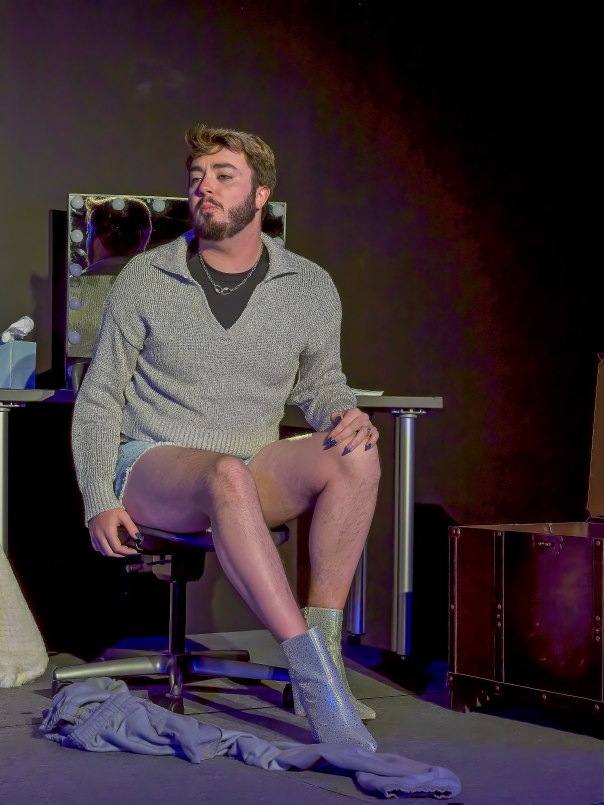Review: Everybody’s Got a Story at VAPA
By Perry Tannenbaum

If you like taking things apart and seeing how they work, there’s an interesting tension at the heart of Everybody’s Got a Story to Tell,the new Charlotte’s Off Broadway production at the VAPA Center. COB producer Anne Lambert describes it more accurately in her subtitle, “The One-Person Play Project.” Then if you apply a QR code reader to your program leaflet, you’ll find that Lambert pulls against the marquee title when she observes that, for some, performing onstage for an audience is a dreaded terror while for others it’s an addictive drug.
Onstage – or on The Moth Radio Hour – baring yourself to the world can be an exhilarating high, especially when you’re showered with laughter and applause. But it turns out that, although we’re certainly watching folk in the addict category, they’re not always telling us their own story. Or blurting it out to us compulsively as might be implied by Everybody’s Got a Story to Tell.
No, when you scan the three titles of the playbill, you’ll hit a roadblock to that confessional concept at the bottom of the page where you discover Eartha Kitt: Cotton to Caviar, written and performed by Toi Reynolds-Johnson. Before that title explodes any notion of a purely soul-baring evening of personal trials, the first play of the evening, Reflection: The Musical might detain you momentarily. Many, many confessions have been crafted into song. But not spontaneously. We know better.

Enriching this impure brew of personal effusions, the names that precede the titles splashed in yellow mustard typeface come into play: director Rob Coppel behind the scenes and PJ Barnes, very much up front as our host. Before we watch Reynolds-Johnson, Spencer Hawkins, and Tyler Wills perform the works they’ve written, Coppel and Barnes conspire to glue the disparate pieces together into a cohesive whole and conjure up the illusion of a natural flow.
Barnes as our emcee actually precedes us into COB’s VAPA nook, welcoming us as we enter and encouraging us to make ourselves at home. So briefly, we are part of the show for those who are already seated. The transition between greeter and emcee is as smooth as possible as the lights dim and Barnes starts strutting the stage in his more prestigious persona, weaving our everybody’s-got-a-story theme. How much of this BS is freshly improvised is hard to discern from whatever Coppel and the writer/performers have fed him in scripted form or as a sort of “head arrangement” as jazz musicians would call it. Whatever, Barnes is one slick and nicely turned-out dude.

The polished impression that Barnes makes contrasts nicely with the vulnerability Wills projects in Reflection, a glittery gay man who is freshly suffering the gut punch of a breakup and feeling the sting of a rejection that will linger for more than a month. After an opening communion in front of a vanity mirror, it’s very apparent that self-loathing is also prominent among Wills’ ills, for he resolutely removes his cruising gear – rhinestone high-heels, high-cut denim shorts with glitter belt, and matching pullover – in favor of workout wear that might be adopted during the isolation of a pandemic.
Double underlining Wills’ self-flagellation, he covers both his vanity mirror and a full-length mirror in shrouds. The powder room is transformed into a house of mourning, and reflection is now done by journaling. In a series of songs and vignettes, Wills is reliving his story rather than telling it. Dramatic intensity is paradoxically increased by Wills’ refusal to break the fourth wall and speak to us, but the intimacy of our encounter with the playwright/lyricist suffers as our peeping is prolonged.
Nor do the pre-recorded melodies, composed by pianist David Roach, dispel the oppressiveness of the 40-day vigil as Wills continues to pour out his anguish and bewail his betrayal. Three nights before Passover, the 40-day, 12-step slog toward self-acceptance and reaffirmation began to feel to me like the Israelites’ 40-year exodus in the Sinai Desert. I gradually despaired that the next song would sound much different from the one I was hearing.
Wills and Roach need to tighten up their collaboration. Or else they need to liven it up with a greater variety of mood and tempos. We’re convinced that Wills has a fine voice and vocal range while we’re frustrated at not seeing more emotional range. Another way to let more light into Reflection before the inevitable uncovering of the mirrors would be by letting us in, occasionally poking some holes in that fourth wall, breaking up the tedium of self-involvement. Just allow the piece to breathe in the here-and-now with occasional retrospective commentary.
Or maybe Wills and Roach overestimated the amount of suspense they were creating. More, please.

Notwithstanding Wills’ final affirmations, I welcomed back Barnes and his stylish patter with more enthusiasm than I’d anticipated. Hawkins and his You’re Accepted offered even more refreshing contrast, though it was also fueled by a breakup. Instead of grieving and self-quarantining, Hawkins deflected, launching into a series of spurious podcasts behind his laptop as if broadcasting his vocational and romantic woes to the wide world live from Davidson. After the parched drought of Reflections, we experienced a dizzying blizzard of sudden twists and turns, inexplicable leaps, mood swings, and casual reveals.
The more Hawkins revealed, the less authentic and autobiographical this confessional, by a Davidson College admissions officer, seemed to me. Cynical, cruelly dismissive, and burnt-out toward the pile of college admission essays on his desk, Hawkins was rather wickedly at-odds with the confessional mode of writing he was practicing himself.

Hopscotching as it does, Hawkins’ script defies a linear summary, likely because it has less to do with the troubles a college administrator has with women and his job, more to do with that cloistered academic’s difficulties in understanding and managing himself and what he’s doing. The quick pacing nicely supports our narrator’s caprices and indecision. What we wind up with is an artful and funny portrait of a peppy but unreliable narrator who lets down his guard often enough to clearly see both his charms and his flaws.
Of the two complete plays, Hawkins’ non-musical was better, but although Reynolds-Johnson’s Eartha was only presented in vignettes after intermission, it easily laid equal claim to the distinction of best on the bill. And where you had to wonder how autobiographical or authentic You’re Accepted and its admissions essays were, you could instantly perceive Reynolds-Johnson’s inspiration. Just look at her eyes! If she didn’t have the idea to portray Kitt on her own, somebody else surely suggested it. Likely on numerous occasions.

We can perversely suggest that R-J looks more like Eartha Kitt than Eartha herself, for when we see her as a child, born on a South Carolina plantation and rejected by both her parents in the opening Cotton scenes, she already looks like the woman she would become at the Caviar conclusion. And the powerhouse superstar who would one day bewitch Orson Welles, make Lady Bird Johnson weep at the White House with her Vietnam War comments, conquer Europe, and play Catwoman on the hit Batman TV series was never more than 62 inches tall.
R-J, likely no taller than her subject, revels in every phase of the Eartha bio. Even the digital playbill doesn’t say, but she’s probably as responsible for the spot-on costumes and props as she is for the writing – though Eartha wrote three autobiographies, plenty to glean from. Nor is R-J at all uncomfortable in sprinkling her various scenes and costume changes with frank narrative, engaging directly with her audience at times. Allowing the diva even more stature in her Caviar phase, Coppel brings Barnes back for one last hilarious shtick as the cabaret queen’s worshipful lackey. Although Adrienne Williams takes on her most prominent role here at the keyboard, we barely get a taste of the Evil One’s full repertoire in snippets of “C’est Si Bon” and “Santa Baby.” Just a cursory look and listen to the top stuff a Google search led me to was more than enough to convince me that there’s plenty of juicy episodes, from her tête-à-têtes with Welles to her verbatim White House harangue, remaining to be unveiled in the complete Eartha.As they stand, the vignettes at VAPA are very tasty and satisfying, but the complete Cotton to Caviar will be richer and spicier.
Photos by Perry Tannenbaum
